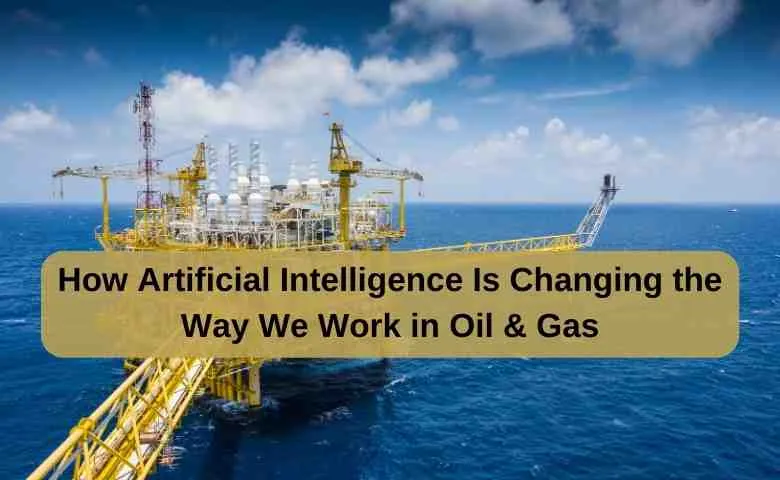Last Updated on October 14, 2024 by Admin
Artificial Intelligence (AI) has revolutionized various industries and is now making its way into the oil and gas sector.
From exploration and production to refining and processing, AI is changing the way we work in this industry by providing valuable insights, optimizing processes, and improving safety measures. With its ability to analyze vast amounts of data, AI is helping companies make better decisions, reduce costs, and increase efficiency.
Let’s delve into the different ways AI is transforming the oil and gas industry and how it is shaping the future of this sector.
Table of Contents
Exploration and Production
In the exploration and production stage, the vast amount of data that is generated can be overwhelming and difficult to analyze manually.
AI algorithms, on the other hand, can quickly process and analyze this data to identify patterns and make predictions. This has made it possible for companies to evaluate large amounts of geological data, including seismic data and satellite imagery, to find new drilling sites.
Using AI algorithms, companies can analyze data from existing wells to predict the yield of new wells in a specific area. This is done by comparing data from past wells with new data to identify similarities and make predictions about the yield of future wells.
Related Posts:
- Careers in the Oil and Gas Industry [An Ultimate Career Guide 2023]
- Energy Industry Overview: Career and Jobs in 2023
- Everything you need to know about Renewable Energy
- Top Oil and Gas Companies In The World [2023 Updated List]
The use of AI in this stage can help companies make informed decisions about where to drill and how to maximize the yield of new wells.
AI algorithms can be used to analyze data from drilling operations to optimize processes and reduce costs. For example, AI algorithms can be used to predict the drilling time required for a well and optimize the drilling process accordingly. This helps reduce the cost of drilling operations and increase the efficiency of the process.
Improved Refining and Processing
The refining and processing stage is a critical component of the oil and gas industry, and optimizing these processes can have a significant impact on the overall efficiency and profitability of a company. AI is helping companies in this stage by providing valuable insights into the performance of their equipment and processes.
Using machine learning algorithms, companies can analyze data from sensors and systems to monitor the performance of their equipment in real-time. This allows companies to detect problems early and make changes to improve the performance of their equipment.
For example, AI algorithms can be used to predict when maintenance will be needed and schedule maintenance accordingly, reducing downtime and increasing efficiency.
AI algorithms can be used to optimize the refining process itself. For example, AI algorithms can be used to predict the composition of crude oil and optimize the refining process accordingly. This can help companies reduce the cost of refining and increase the yield of their operations.
AI algorithms can be used to optimize the logistics of refining and processing. By analyzing data from transportation systems, companies can optimize the delivery of crude oil to refineries and the delivery of refined products to customers. This can help reduce costs and increase the efficiency of the overall process.
Predictive Maintenance
Predictive maintenance is a key application of AI in the oil and gas industry and has the potential to significantly impact the efficiency and profitability of companies in this sector. By using machine learning algorithms, companies can analyze data from sensors and systems to predict when equipment is likely to fail.
This allows companies to perform maintenance before the equipment actually fails, reducing downtime and increasing efficiency. In the oil and gas industry, equipment failure can be costly and time-consuming to repair. By using predictive maintenance, companies can avoid these costs and reduce the impact of equipment failure on their operations.
Predictive maintenance can also help companies save money on maintenance costs. By performing maintenance before equipment fails, companies can avoid more expensive repairs and extend the lifespan of their equipment. This can result in significant savings for companies in the long term.
AI-based predictive maintenance is helping companies improve safety measures in the oil and gas industry. By detecting potential problems early, companies can take steps to prevent accidents and improve the safety of their operations.
Optimization of Supply Chains
Companies are using AI algorithms to analyze data from various sources, including transportation systems, logistics networks, and inventory systems, to optimize their supply chains and reduce costs.
One key area where AI is making an impact is in the prediction of demand for oil and gas.
By analyzing data from various sources, such as market trends and consumer behavior, AI algorithms can provide valuable insights into future demand for oil and gas. This information can help companies better manage their inventory and reduce waste by ensuring they have the right amount of products in stock to meet demand.
AI is also helping companies optimize their transportation networks and reduce costs associated with transportation. By analyzing data from transportation systems, companies can optimize their delivery routes and reduce the time and cost associated with transportation. This can result in significant savings for companies in the long term.
AI algorithms can be used to optimize logistics networks and improve the efficiency of the overall supply chain. For example, AI algorithms can be used to predict bottlenecks in the supply chain and identify areas where improvements can be made. This can help companies reduce costs and increase the efficiency of their operations.
Enhanced Safety
Safety is a top priority in the oil and gas industry, and AI is playing a critical role in enhancing safety measures. By analyzing data from various sources, including sensors and systems, companies can identify potential safety hazards and take steps to mitigate them.
One of the key areas where AI is making a difference is in the monitoring of equipment performance. By using machine learning algorithms, companies can monitor the performance of equipment in real-time and predict when it is likely to fail. This allows companies to take proactive steps to prevent equipment failure, reducing the risk of accidents and improving safety.
AI algorithms can also be used to analyze data from sensors and systems to identify potential safety hazards. For example, AI can be used to detect gas leaks and predict the likelihood of fires or explosions. This information can be used to implement preventative measures and reduce the risk of accidents.
AI can be used to improve emergency response times in the event of an accident. By analyzing data from various sources, AI algorithms can provide valuable insights into the cause of an accident and provide critical information to first responders. This can help improve the speed and effectiveness of emergency response and reduce the impact of accidents.
Conclusion
AI is transforming the way we work in the oil and gas industry. From exploration and production to refining and processing, AI provides valuable insights and improves efficiency in every industry aspect. The use of AI algorithms is helping companies reduce costs, increase yields, optimize supply chains, and enhance safety.
The potential benefits of AI in the oil and gas industry are vast and continue to evolve as technology improves. By leveraging the power of AI, companies can gain a competitive advantage and stay ahead of the curve in an ever-changing industry.
It is clear that AI is changing the way we work in the oil and gas industry, and this trend is only set to continue in the future.
As AI technology continues to evolve, it is likely that we will see even more innovative applications and benefits in this industry. Companies that embrace AI and invest in this technology will be well positioned to succeed in the years to come.
FAQs
Artificial Intelligence (AI) refers to the development of computer systems that can perform tasks that typically require human intelligence, such as perception, decision-making, and language understanding. In the Oil & Gas industry, AI is being used to automate and optimize a wide range of processes, from exploration and production to refining and distribution. This includes the use of machine learning algorithms to analyze large amounts of data, automate routine tasks, and improve operational efficiency.
The use of AI in the Oil & Gas industry is leading to a transformation of the workforce, with many routine and manual tasks being automated. This allows employees to focus on higher-value tasks that require human expertise and creativity. At the same time, it also requires workers to acquire new skills and adapt to new technologies, leading to the need for upskilling and reskilling initiatives.
There are several benefits to using AI in the Oil & Gas industry, including:
1. Increased efficiency: AI can automate routine tasks and optimize complex processes, leading to increased efficiency and reduced costs.
2. Improved decision-making: AI can analyze large amounts of data and provide insights to support decision-making, improving the accuracy and speed of decision-making processes.
3. Enhanced safety: AI can be used to monitor operations and identify potential safety hazards, helping improve workplace safety.
4. Reduced environmental impact: AI can optimize production processes, reducing waste and minimizing the environmental impact of oil and gas operations.
There are several challenges and limitations to using AI in the Oil & Gas industry, including:
1. Data quality and availability: AI relies on large amounts of data to train algorithms and make predictions, and the quality and availability of data can impact the effectiveness of AI applications.
2. Regulation and privacy: The use of AI in the Oil & Gas industry is subject to a range of regulations and privacy laws, which can impact the implementation of AI solutions.
3. Skill and talent shortages: There is a shortage of skills and talent in AI and data science, which can limit the ability of companies to implement AI solutions and realize the full benefits of AI.
4. Ethical and social considerations: The use of AI raises various ethical and social considerations, such as the impact on jobs and the potential for bias in decision-making.
Related Posts:
- What are the Points to Consider While Taking Boiler Repair Services?
- Best Oil and Gas Recruitment Consultants [2023 Updated List]
- Best Oil and Gas Companies of India [2023 Updated List]
- Will Top Oil & Gas Giants Survive?
- The Best Flow Meters For Oil And Gas Measurement
- What Is Geothermal Energy, And How Does it Work?
- The Complete Guide to the Different Types Of Green Energy
- ZERO ENERGY BUILDING


